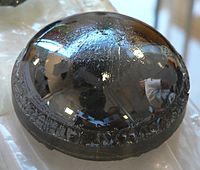
Photo from wikipedia
Abstract In this paper, the performance of both silicon carbide (SiC) MOSFETs and silicon (Si) IGBTs based electric vehicle (EV) traction systems are investigated and compared comprehensively, particularly from the… Click to show full abstract
Abstract In this paper, the performance of both silicon carbide (SiC) MOSFETs and silicon (Si) IGBTs based electric vehicle (EV) traction systems are investigated and compared comprehensively, particularly from the efficiency point of view. Both conduction loss and switching loss of SiC-MOSFETs are analyzed and modeled taking temperature effect into account. Such approach yields a more accurate prediction of SiC losses. The temperature distribution of SiC-Inverter is described by ANSYS finite element analysis (FEA), and compared with Si counterparts. According to the lower losses and higher thermal conductivity, SiC exhibits much lower temperature than Si under the same power rating and cooling condition. Subsequently, this paper goes further by conducting an investigation of the effect of SiC-Inverter on the motor efficiency. Experimental results show that the SiC-based inverter-motor traction system has observably higher efficiency of overall system compared to the Si-based traction system, and first explore that the motor has extremely high efficiency under low speed and light load when it is driven by a SiC-MOSFETs based inverter due to the higher switching speed of SiC MOSFETs. Meanwhile, the experimental results also confirm the losses models of SiC MOSFETs.
Journal Title: Applied Energy
Year Published: 2017
Link to full text (if available)
Share on Social Media: Sign Up to like & get
recommendations!